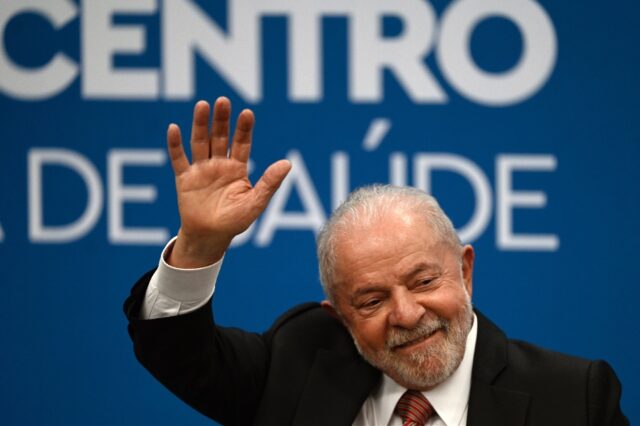The US and Brazil will seek to reset ties this week when President Luiz Inacio Lula da Silva travels to Washington to meet Joe Biden, both keen to turn the page on the Jair Bolsonaro years.
Veteran leftist Lula, who took office for a third term last month after defeating far-right incumbent Bolsonaro, will hold what his team called a highly symbolic meeting with his American counterpart Friday afternoon at the White House.
“The most important aspect of the visit is political: the symbolism of this meeting happening so soon after President Lula took office,” said Brazilian foreign ministry official Michel Arslanian Neto.
“It’s an opportunity for the two leaders to meet face-to-face and give the relationship a new direction and new momentum,” he told journalists Tuesday.
US-Brazilian ties turned chilly after Biden defeated Donald Trump, Bolsonaro’s top ally and political role model, in the 2020 presidential race.
Lula’s return now paves the way for a rapprochement.
Biden, 80, and Lula, 77, know each other from the days when the US Democrat served as Barack Obama’s vice president (2009-2017) and the Brazilian leftist was in the home stretch of his first presidency (2003-2010).
The White House said they would discuss “common challenges” including climate change, food security, economic development, security and migration — as well as “the United States’ unwavering support of Brazil’s democracy” and the need to promote “democratic values” worldwide.
Fighting far-right ‘radicalization’
“Defending democracy” will be a key agenda point, said Fernanda Magnotta, a specialist on US-Brazilian relations at the FAAP foundation in Sao Paulo.
Biden and Lula share remarkably common ground on the issue.
Both came to office after defeating right-wing populists who made unproven allegations of election fraud.
And both started their presidencies against the backdrop of riotous attacks on the halls of power by their predecessors’ supporters — in Biden’s case, the January 6, 2021 invasion of the US Capitol; in Lula’s, the January 8, 2023 invasion of the presidential palace, Congress and the Supreme Court in Brasilia.
“The issue on which they have the greatest affinity… is the fight against the radicalization of the far-right,” political analyst Guilherme Casaroes of the Getulio Vargas Foundation told AFP.
Bolsonaro, who was among the last world leaders to congratulate Biden after his 2020 election win, has been living since the end of his presidency in Florida, Trump’s own primary residence.
However, that particular subject is not expected to be mentioned during the visit, Brazilian officials said.
Climate accord
Biden and Lula are also expected to find ample common ground on the key issue of the environment.
Under Bolsonaro, deforestation surged in the Amazon rainforest, a key buffer against climate change. Since winning election, Lula has been hammering home the message that “Brazil is back” as a partner in the race to curb global warming.
“It’s an absolute priority” for the Lula administration, said Casaroes.
“All signs indicate he will manage to align Brazil’s environmental agenda to meet US expectations.”
Lula has vowed to achieve zero illegal deforestation in the world’s biggest rainforest by 2030.
“There is no alternative,” Rubens Barbosa, a former Brazilian ambassador to the US, told AFP.
“Lula will have to deliver.”
Touchier subjects
There will be “ample space” to discuss expanding trade ties and bilateral investment during the visit, said Magnotta.
Brazil is also keen to increase its access to the US defense market, Arslanian Neto told reporters.
But there are thornier subjects, too.
Lula has raised eyebrows in the West with his relatively soft stance on Russia’s invasion of Ukraine.
He also wants to normalize Brazil’s relations with Venezuela and resume cordial ties with China.
China is Brazil’s top trade partner, with $152.6 billion in bilateral trade last year. The United States is a distant second, at $88.8 billion.
Latin America’s largest economy is “heavily dependent on Asia, especially on China, for trade and investment,” said former ambassador Barbosa.
So even as Lula seeks closer ties with the US, he will be looking to return to Brazil’s “balanced” foreign policy stance, said Casaroes: “constructive relations with all countries, without aligning automatically with any global power.”
That marks another turnaround from the Bolsonaro years.

COMMENTS
Please let us know if you're having issues with commenting.